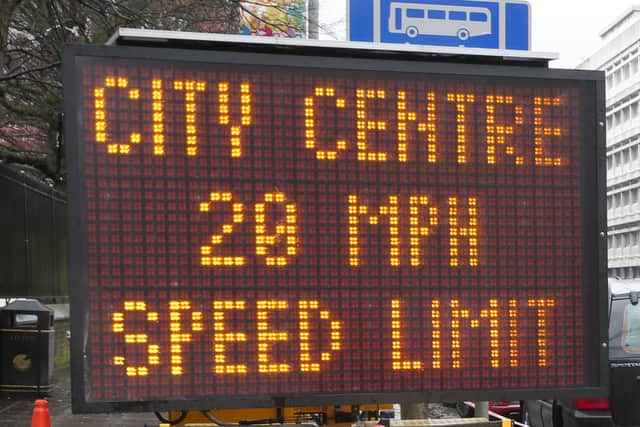Crashes cut by 20mph speed limit
and live on Freeview channel 276
Researchers from the Queen’s University Belfast took part in the study, which also examined the impact of 20mph zones in Great Britain and found they had a higher impact.
The researchers said the results reflect the scheme’s narrower reach in Belfast and its implementation in an area where traffic speeds were already low prior to the trial – on average under 20mph.
Advertisement
Hide AdAdvertisement
Hide AdProfessor Ruth Hunter, from Queen’s University, said a city-wide expansion of 20mph limits in Belfast would likely lead to further reductions in crashes, casualties and other important public health outcomes.


The study found that accident rates across Edinburgh fell even without extra traffic-calming measures and police patrols – making the scheme cost-effective.
It concluded that the “relatively modest” cost of replacing speed limit signs not only improved road safety but also enhanced quality of life for residents.
Prior to the new restrictions, 45 out of 100 cars in Edinburgh travelled above 25mph.
A year later, the figure had dropped to 31.
Advertisement
Hide AdAdvertisement
Hide AdAverage speeds on affected roads also fell, according to the study.
Researchers say the number of crashes in one year fell by 40% to 367 and there were 409 fewer casualties – a drop of 39%.
They worked with local and national traffic authorities to gauge the effectiveness of 20mph restrictions introduced by the City of Edinburgh Council in 2016.
The new limits applied on 80% of Edinburgh’s streets in a bid to cut accidents, encourage more walking and cycling and improve neighbourhoods.
Advertisement
Hide AdAdvertisement
Hide AdThe research, which also assessed the smaller scheme in Belfast, found that reducing traffic speed also helps to create better quality environments.
Researchers measured liveability – safety, health, sustainability, education, transport, amenities and living standards – and found it improved in both cities after the introduction of speed restrictions.
One year after implementation, the number of people who were supportive of the speed limits increased, as did their willingness to obey the limits. Researchers interviewed residents to assess the overall impact. They also examined official records and data and studied how decisions were reached and regulations were enforced.
Project leader Professor Ruth Jepson, of the University of Edinburgh, said: “The study shows that city-wide speed reductions can reduce collisions and casualties and that they were increasingly accepted by the local community.”
Advertisement
Hide AdAdvertisement
Hide AdEdinburgh City Council’s former transport and environment convener, Lesley Hinds – who proposed the scheme – said: “It is encouraging to see the reduction in deaths, accidents and speeds.
“It is also good there is an increase in support from the public in residential streets as well as in the city centre.”
The study was funded by the National Institute for Health Research, which has also published the findings.
l Morning View, page 14